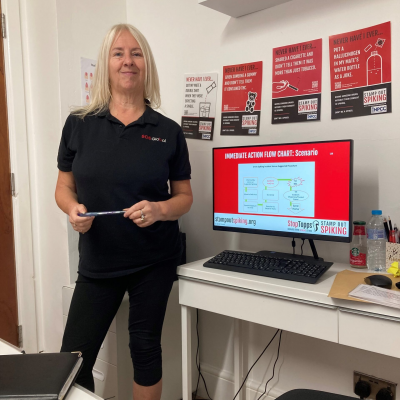New data has revealed only a fractional amount of spiking reports in the UK lead to a conviction, as experts warn tackling the wave of drink spiking is “almost impossible”.
Between May 2022 and April 2023 police received 6,732 reports of needle and drink spiking, but only 61 people were convicted for spiking related offences last year.
Professor Nicole Westmarland, Director of the Durham Centre for Research into Violence and Abuse, says a single law will only be effective if other issues such as testing are addressed.

Professor Nicole Westmarland has advised police and the government on spiking. Credit: Durham University
She said: “I think at the moment it would only make a small difference. We already have laws against poisoning people which is what spiking is.
“Until we know the motivations behind spiking we really are operating in the dark in terms of how we identify suspects, how we build evidence against them and what we do for crime prevention. It’s one part of the jigsaw, but if it’s introduced without improvements in drug testing it’s not going to get us very far.”
A study carried out by the American Psychological Association found the most common reason for spiking someone’s drink was ‘for a laugh’, but no such study has been done in the UK, and without knowing why people carry out spiking, effective action is impossible to implement.
She said: “It is the million dollar question and we don’t know the answer to that. Just identifying those perpetrators is incredibly difficult and therefore studying the motivations is incredibly difficult.
“Is it a small number of perpetrators that are going around spiking lots of people, or are lots of people spiking? There’s very basic questions we don’t have answers to, which means designing effective intervention is almost impossible because we’re doing it without any knowledge of the motivations.”
Another issue facing police is a lack of evidence, as tests for spiking carried out in hospitals are not admissible as evidence in court, and by the time people do get tested any drugs may have left their system.

Professor Westmarland said: “There’s a period of time that passes before somebody thinks maybe they were spiked and they need to go to the police, so there’s a big gap in evidence, and a big gap in the victim’s knowing what has been put in their body. The drug testing we have is very limited in what it’s able to pick up.
“But even tests that are sent away for forensics can only show what drugs someone hasn’t been spiked with. It still doesn’t mean someone hasn’t been spiked with over-the-counter drugs, additional alcohol and a whole range of other things.”
Alcohol is the most common substance used to spike someone’s drink, but it is not an offence to add additional alcohol to a drink already containing alcohol without consent.
Dawn Dines, CEO of Stamp Out Spiking, a charity which offers training to bar staff and police to deal with spiking, has called on the government to make spiking a single offence to improve the low conviction rate.
She has been campaigning to raise awareness about spiking since 2004 and appeared as an expert witness at parliament during a public inquiry into spiking in 2022.

Dawn Dines founded Stamp Out Spiking in 2019. Credit: Stamp Out Spiking
She said: “I realised that after speaking to people from all over the UK there’s a problem with the system. I campaigned to get the antiquated act updated to make sure that spiking was put into the wording. It really does need a specific offence code.
“I understand there’s a lot of issues going on but at the end of the day we still have men and women getting raped and robbed and humiliated and being put in a dreadful position and that’s still happening every week.”
Other campaign groups such as The Egalitarian, which offers a space for victims to share their experiences anonymously, and Spike Aware who support victims who feel uncomfortable going to the police, have also called for a single law to cover spiking.
As well as issues with testing, a lack of coordination between health services and the police, proper training for bar staff, and 97% of cases going unreported, all make addressing spiking extremely difficult.
Last year the Home Secretary James Cleverly announced more funding would be given to train bar staff and police and improve testing, but no change in the law was on the table. Cleverly was heavily criticised after joking about spiking his own wife at a reception, but Ms Dines wants to keep the focus purely on the law.
She said: “I am sure if he (Cleverly) knew what rohypnol does to a person he wouldn’t be joking about it, it just reiterates the need for urgent education across the whole forum.
“I had to make a decision to not make a big thing over it to make sure I was staying focussed on the mission at hand and to stop men and women getting robbed and being abused.”
Keir Starmer pledged to make spiking a single offence should Labour win the next general election, yet without additional measures spiking is likely to remain under-reported and easy to get away with.
A cycle of failure has led to spiking becoming a normalised crime, and until the cycle is broken and effective measures are implemented, it will continue to happen and perpetrators will continue to evade justice.



